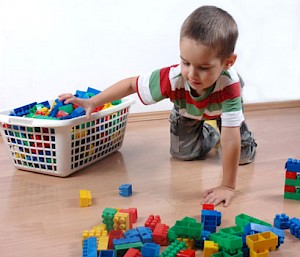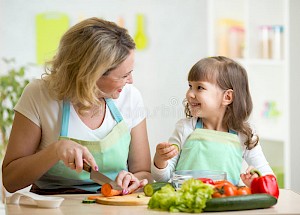With independence over certain daily activities and choices, a child can develop:
- Personal responsibility

- self-esteem
- confidence
- resilience
- increased internal motivation
- a sense of identity
- wellbeing
- fine and gross motor skills
- problem solving abilities
- language skills
- organisational skills
- working memory skills
Increased responsibility can impact a child’s self-image to seeing themselves as a productive member of society who has control over the things that happen around them. Two of the key ways in which a child can develop a sense of independence include:
Assisting with household and community tasks
Between the ages of three to five children can begin to participate in household and community tasks. It can often be faster and less messy to do things for our children, however giving a child the opportunity to assist with household tasks allows the opportunity for children to develop a sense of importance, purpose and confidence, community skills, fine and gross motor and motor planning skills to name a few. Some ideas to increase your child’s involvement in household or community tasks include:
- allowing your child to put away their own toys and clothes
- allow the child to make their own bed
- if using a clothes horse to dry clothes the child can help with hanging lower items (this is a great one for fine motor development and postural control)
- allowing the child choice over clothing and helping the child to develop the skill of choosing weather appropriate clothing
- involving the child in meal preparation (chopping vegetables, peeling potatoes, grating carrots, mixing salads etc.)
- lay the table settings for dinner time
- having small amounts of animal food low down and allowing the child to feed pets
- providing smaller portions of milk and spreads and allowing the child to attempt to pour own cereal in the morning or spread their own toast
- getting your child involved in cleaning tasks, allowing them to wipe the table or help sweep up (smaller brooms etc can be purchased)
- talking to the child throughout the shops about what you are purchasing and doing. Get them to remember a few items on your list. As the child gets older, allowing them to collect items from the shop.
- allowing the child to help place items on the shopping belt or help with the payment of smaller items.
Play
Play is one of the most important occupations for a young child to participate in. Play, especially that which is self-directed and child led, provides children with the opportunity to develop many key skills including: language, social, motor and coordination, imagination and coordination, emotional regulation and empathy, self-awareness, confidence, problem solving and conflict resolution and develop interests.
For strategies on how to play with your child and how to aid the development of their play skills please see our article: why kids need to play!
Our website has lots of activities and information to download about children’s development, learning and language. If you are concerned about your child browse our website to see how Talking Matters can help your child.
We offer play skill, food and cooking and social skills groups in school holidays to help children develop play skills and the ability to play with others. Browse our website or call us on (08) 8255 7137 to find out more.
Some information within this article was based on information contained within Australian Government Department of Education, Employment and Workplace Relation’s (2009) Belonging, Being & Becoming: The Early Years Learning Framework for Australia and Case-Smith and Clifford O’Brian’s (2015) Occupational Therapy for Children and Adolescents.
Blog written by Rebecca Appleby, Occupational Therapist
Related Blog Posts
If you liked this post you may also like:
Christmas fun 2012!
Christmas fun 2016!
Talking Matters turns 10!
Fine motor skills for children



